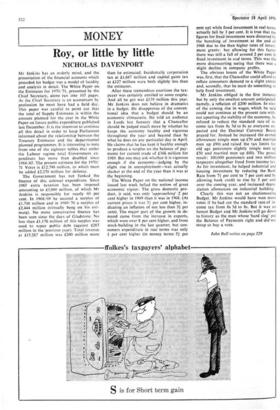MONEY Roy, or little by little
NICHOLAS DAVENPORT
Mr Jenkins has an orderly mind, and the presentation of the financial accounts which preceded his budget was a model of lucidity and analysis in detail. The White Paper on the Estimates for 1970/71, presented by the Chief Secretary, alone ran into 105 pages. As the Chief Secretary is an accountant by profession he must have had a field day. This paper was careful to point out that the total of Supply Estimates is within the amount planned for the year in the White Paper on future public expenditure published last December. It is the intention to continue all this detail in order to keep Parliament informed about the relationship between the Treasury Estimates and the departmental planned programmes. It is interesting to note from one of the eighteen tables that under the Labour regime total Government ex- penditure has more than doubled since 1964/65. The present estimate for the 1970/ 71 Votes is £12,790 million, to which must be added £2,270 million for defence.
The Government has not funked the finance of this colossal expenditure. Since 1965 extra taxation has been imposed amounting to £3,000 million, of which Mr Jenkins is responsible for nearly 60 per cent. In 1968/69 he secured a surplus of £1,748 million and in 1969/70 a surplus of £2,444 million (virtually bang on his esti- mate). No more conservative finance has been seen since the days of Gladstone. No less than £1,176 million of this surplus was used to repay public debt (against £287 million in the previous year). Total revenue at £15,267 million was £260 million more than he estimated. Incidentally corporation tax at £1,687 million and capital gains tax at £127 million were both slightly less than the estimates.
After these tremendous exertions the tax- payer was certainly entitled to some respite. And all he got was £139 million this year. Mr Jenkins does not believe in dramatics in a budget. He disapproves of the conven- tional idea that a budget should be an economic climacteric. He told an audience in Leeds last January that a Chancellor should be judged much more by whether he keeps the economy healthy and vigorous throughout the year and beyond than by what he does on any particular day in April. He claims that he has kept it healthy enough to produce a surplus on the balance of pay- ments for current trade of £366 million for 1969. But one may ask whether it is vigorous enough if the economy—judging by the slight rise in unemployment—was actually slacker at the end of the year than it was at the beginning.
The White Paper on the national income issued last week belied the notion of great economic vigour. The gross domestic pro- duct, it said, was only 'approaching' 2 per cent higher in 1969 than it was in 1968. (At current prices it was 5+ per cent higher, in- dicating an inflation of not less than 3+ per cent). The major part of the growth in de- mand came from the increase in exports, which were over 8 per cent higher, and from stock-building in the last quarter, but con- sumers expenditure in real terms was only I- per cent higher (in money terms 5+ per cent up) while fixed investment in real terms actually fell by 3 per cent. It is true that the figures for fixed investment were distorted by the bunching of investment at the end of 1968 due to the then higher rates of invest- ment grants: but allowing for this factor there was still a fall of around 2 per cent in fixed investment in real terms. This was the more disconcerting seeing that there was a slight decline in ootnpany profits.
The obvious lesson of the White Paper was, first, that the Chancellor could afford to reflate consumers demand to a slight extent and, secondly, that he must do something to help fixed investment.
Mr Jenkins obliged in the first instance but by only the smallest amount anticipated. namely, a reflation of £200 million. In view of the coming rise in wages, which he said could not continue at the present rate with- out upsetting the stability of the economy, he refused to reduce the standard rate of in- come tax from 8s 3d to 8s as everyone ex- pected and the Decimal Currency Board prayed for. Instead he increased the earned allowances (single men up £70 and married men up £90) and raised the tax limits for old age pensioners slightly (single men up £50 and married men up £60). The proud result: 100,000 pensioners and two million taxpayers altogether freed from income tax. As for investment, he helped industrial and housing investment by reducing the Bank Rate from 7+ per cent to 7 per cent and by allowing bank credit to rise by 5 per cent over the coming year, and increased depre- ciation allowances on industrial building.
Clearly this was not an electioneering Budget. Mr Jenkins would have won more votes if he had cut the standard rate of in- come tax from 8s 3d to 8s. But it was an honest Budget and Mr Jenkins will go down to history as the man whose 'hard slog' put the Balance of Payments right and did not stoop to buy a vote.
John Bull writes on page 529
ffolkes's taxpayers' alphabet
S is for Short term gain






































 Previous page
Previous page